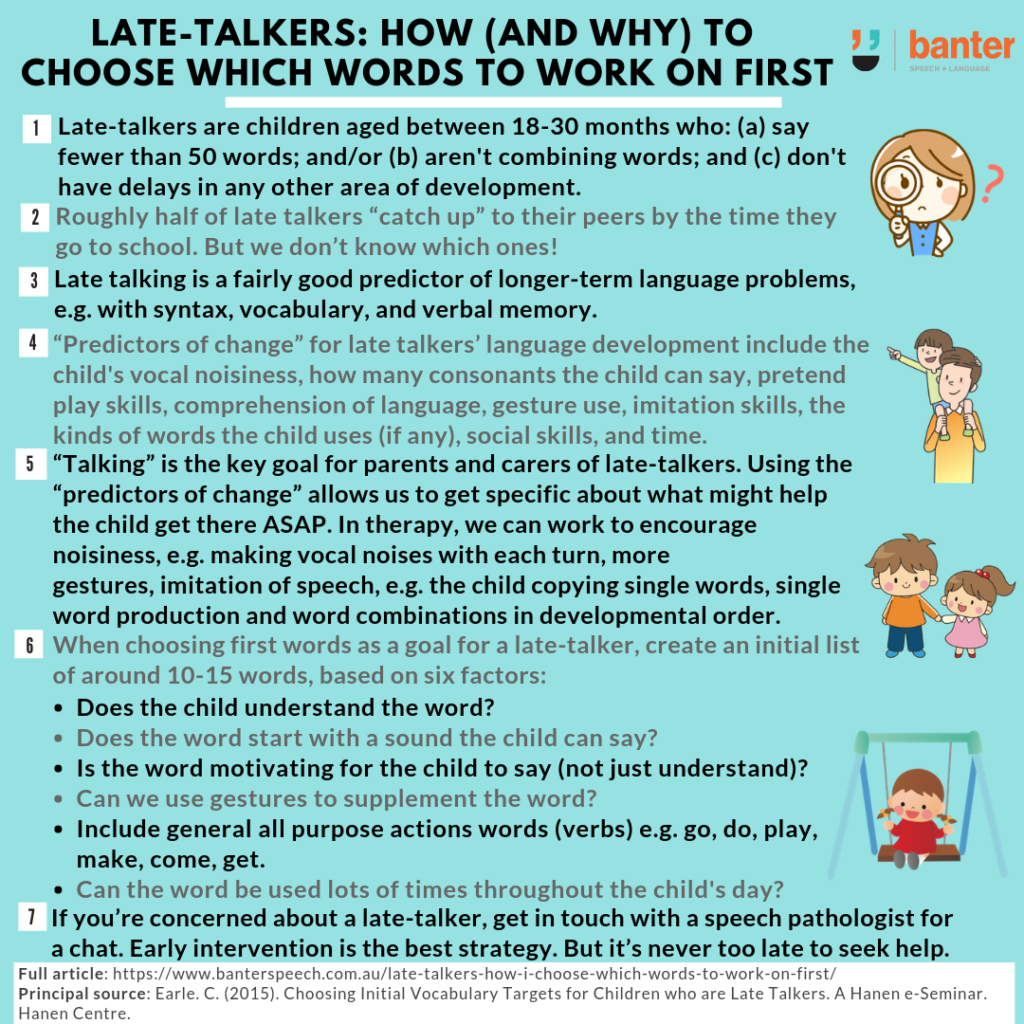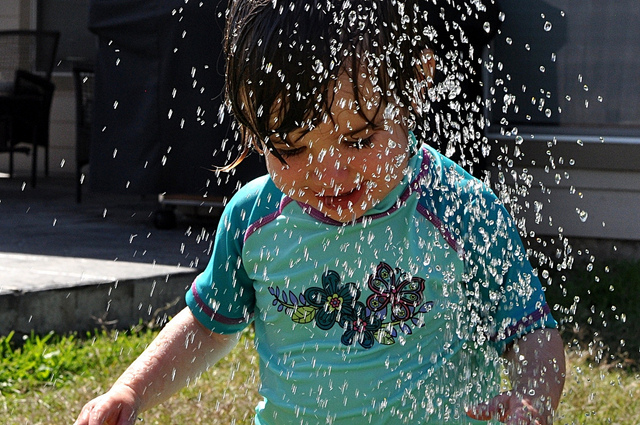Late talkers: how I choose which words to work on first
Choosing words to teach* late talkers is hard – for both parents and speech pathologists! But there’s some great research out there to guide decision-making, if you know where to look.
As a Hanen-certified speech pathologist, I’ve just completed a very practical seminar on word choice for late talkers presented by Cindy Earle, the Program Director for Hanen’s Target Word program.
For the benefit of parents and others caring for late-talking children, I thought I’d share my key takeaways:
1. What do we mean by a “late talker”?
The research definition of a ‘late talker’ is a child aged between 18 and 30 months who:
- says fewer than 50 words; and/or
- isn’t combining words; and
- doesn’t have delays in any other area of development, e.g. receptive language disorders, autism spectrum disorder or motor delays.
Hanen’s clinical definition is much the same, but includes children who have fewer than 100 words. I prefer this definition because it captures more children who might be at risk and who might benefit from early intervention.
2. Why does late-talking matter? Should we be concerned about it?
To answer the second question first: yes.
We know that roughly half of late talkers ‘catch up’ to their peers by the time they go to school. But, unfortunately, we don’t yet know which ones! For the ‘other half’, the late onset of language is a good predictor of long-term language problems – particularly with syntax, vocabulary, and verbal memory (Rice, 2008; Rescorla, 2009).
3. Known risk Factors
We discuss known red flags for language delays here.
4. Predictors of change/improvement
This was my first big takeaway from Cindy’s talk. Drawing on studies by Olswang and colleagues (1998) and Wetherby (2000), Earle identified the following factors as ‘predictors of change’ for late talkers’ language development:
- quietness/noisiness;
- consonant repertoire (i.e. how many consonants the child can say);
- pretend play skills;
- comprehension;
- gestures;
- imitation;
- the kinds of words the child uses (if any);
- social skills; and
- time.
5. Getting specific about language goals for late talkers
‘Talking’ is of course the main goal for parents and carers of late talkers. But teaching children random words without a plan or goal is not the way to do it. Knowing about the above ‘predictors of change’ allows us to get more specific about what might help the child get there ASAP, based on where they are at at the time of assessment:
- noisiness, e.g. the child will vocalise with each turn;
- imitation, e.g. the child will copy single words;
- single words, e.g. the child will use single words spontaneously; or
- combinations e.g. the child will combine words.
6. So, here’s what I think about when choosing words for a late talker
At the outset of therapy, I like to discuss and agree 10-15 target words with the families of late talkers I work with. To come up with the list, we consider the following six factors:
(a) Does the child understand the word?
There’s no point trying to teach a child to say a word he or she doesn’t understand.
(b) Does the word start with a sound the child can say?
The technical term for this is ‘in phonology’. We know that children are more likely to experiment with words that start with a sound in their existing repertoire of speech sounds. That’s why getting a speech sound sample is so important when we assess late talking children, even if they are only babbling and not saying any ‘true words’.
(c) Is the word motivating for the child to say (not just understand)
Some kids are very interested in a favourite bedtime toy, pet, TV character, etc. To maximise motivation for talking, I always try to include words that refer to the child’s ‘favourite things in the world’ – even – eek! – if it involves the motion picture Frozen. (Let It Go, David!)
(d) Can we use gestures to supplement the word?
Gesture science can get a bit technical and jargon-laden: I plan to tackle this important topic in a future blog post (or two!). But, for the purposes of this article, we know that certain gesture-speech combinations help some late talkers to combine words (McEachern & Haynes, 2004).
If we’re trying to help a late talker combine words, teaching him/her gestures that supplement (rather than just echo) his/her words can help. For example, teaching a child to point at things and to say applicable words like ‘go’ or ‘fast’ or ‘big’, can provide children with a bridge to developing multi-word utterances (e.g. ‘car go’, ‘fast dog’, ‘big tree’).
(e) Verbs, verbs, verbs
We’ve covered this point before. But it bears repeating:
In English, you need at least one verb (action word) to make a complete sentence (e.g. ‘go’ or ‘fish swim’). So teaching children the names of things and people (e.g. ‘mama’, ‘car’) and positions (e.g. ‘up’) is not enough. If we want to help late talkers combine words into sentences, we MUST include verbs.
For this reason, I always choose at least four ‘all purpose’ verbs in my initial word list for late talkers: e.g. go, do, play, make, come, get. The fancy name for this practice is ‘verb-focused intervention’ (e.g. Hadley & Olsen, 2005).
(f) Words that occur throughout the day
Just like with verbs, we don’t want to spend our time on words that won’t come up a lot during the day. One trick is to look for things that the child loves to do a lot of during the day. This varies from child to child. Observe the child doing it, then come up with words that will give you plenty of time to use them several times a day.

Bottom line
Correct word choice is very important when helping a late talker. Early intervention is the best strategy.
If you’re the parent or carer of a late talker – or potential late talker – we recommend you get in touch with a certified practising speech pathologist for a chat and, if warranted, to organise a language assessment.
Related articles:
- Late talkers: kick-start language with these verbs
- Why I tell parents to point at things to help late talkers to speak
- ‘He was such a good baby. Never made a sound!’ Late babbling as a red flag for potential speech-language delays
- I want to help my late talker to speak, but I’m stuck at home. What can I do?
- Does my child have a language disorder? 6 questions speech pathologists should ask before assessment
- How do babies and toddlers choose their first words?
- Are language development and motor development related?
- 6 principles we follow when assessing toddlers for language delays and disorders
- Helping toddlers with their first words – mix it up and make them useful
Key source: Earle. C. (2015). Choosing Initial Vocabulary Targets for Children who are Late Talkers. A Hanen e-Seminar. Hanen Centre. (Attended by the writer on 13-17 July 2015.)
* For you fellow Chomsky/Pinker fans out there, please note that I’m using the word ‘teach’ loosely here – I could have said ‘naturalistic indirect language stimulation based on principles of interactive communication’ to make the point that we don’t actually teach language to children: we just help them help themselves. But life’s too short!
Image: http://bit.ly/1JsaZWB

Hi there, I’m David Kinnane.
Principal Speech Pathologist, Banter Speech & Language
Our talented team of certified practising speech pathologists provide unhurried, personalised and evidence-based speech pathology care to children and adults in the Inner West of Sydney and beyond, both in our clinic and via telehealth.








